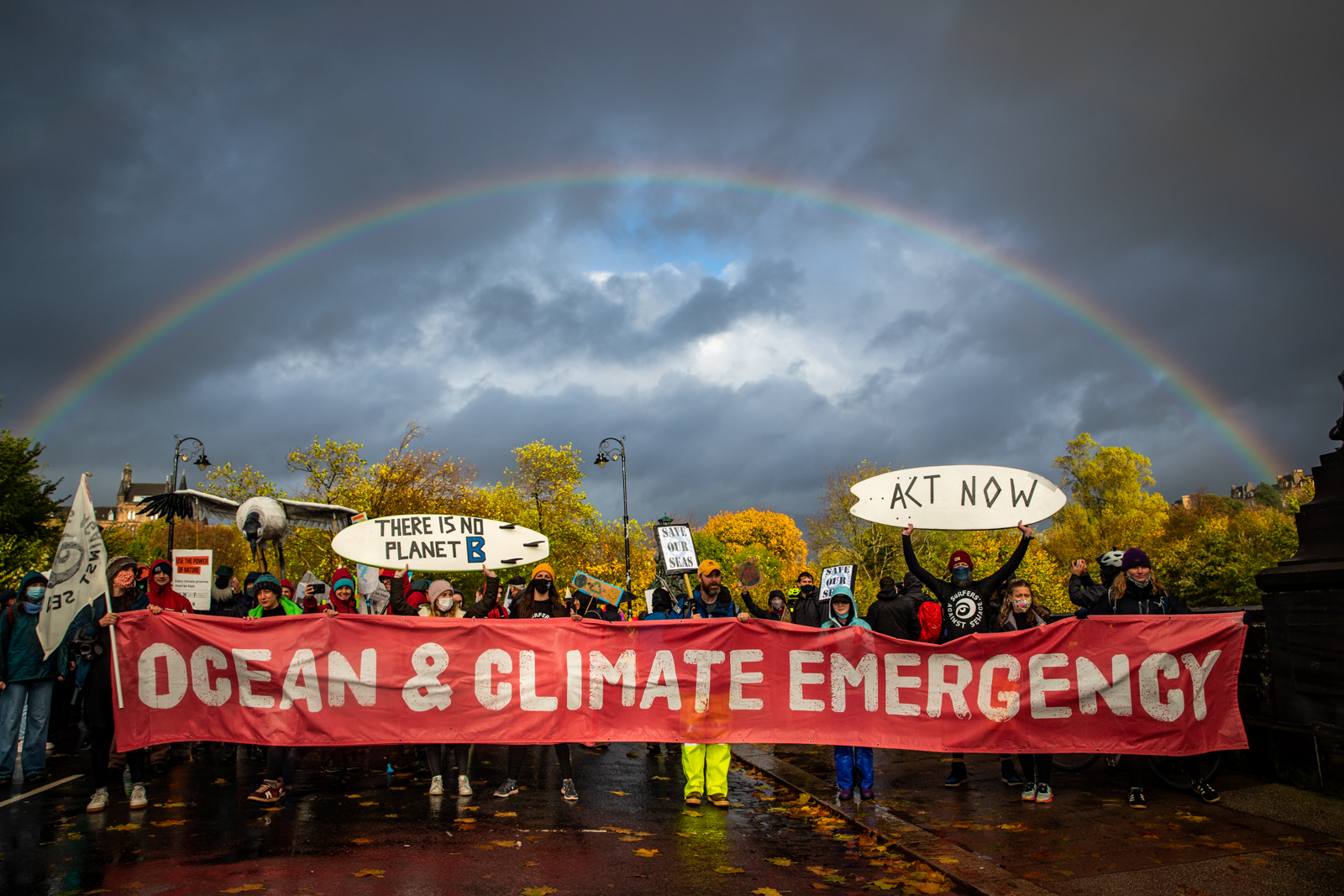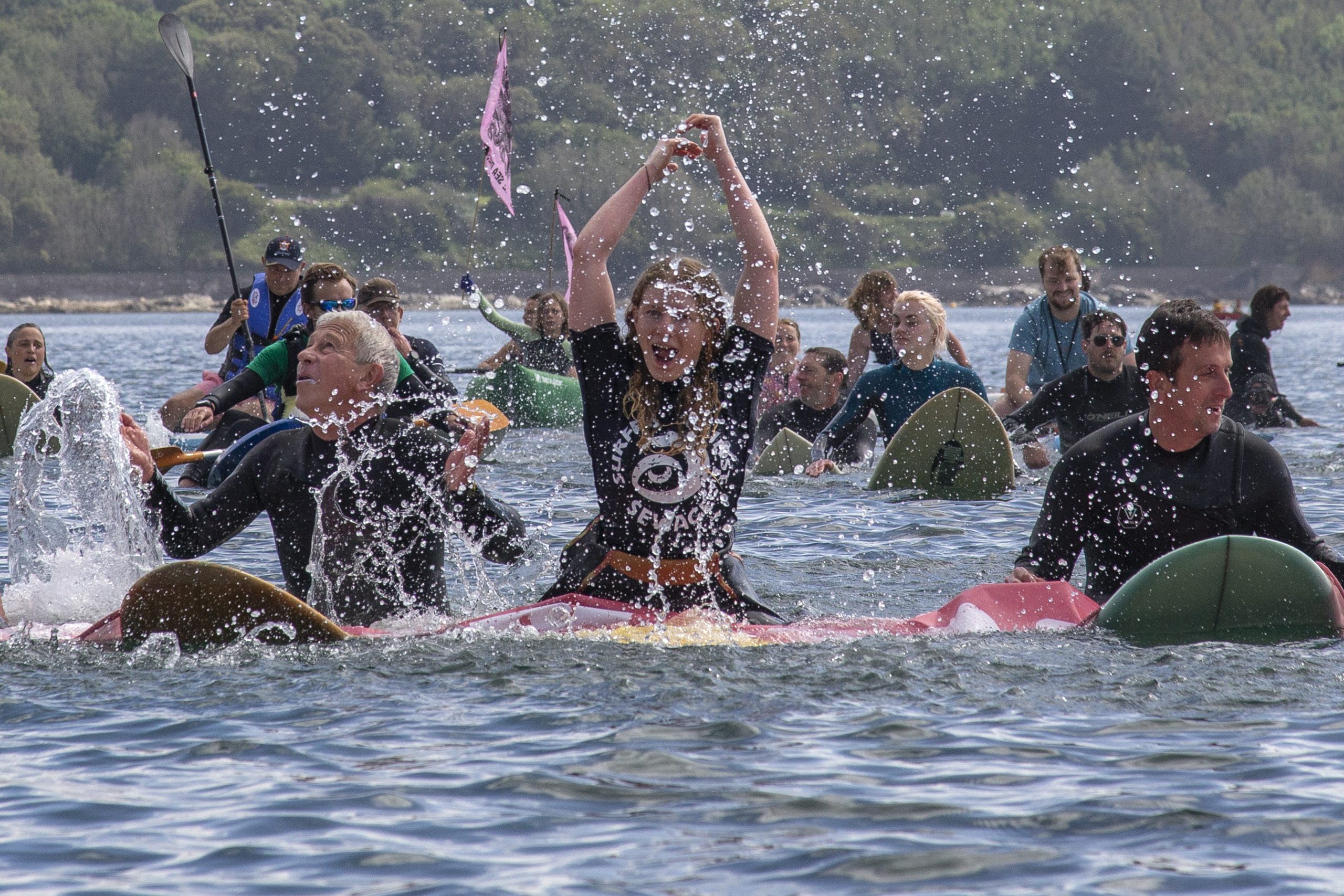
COP26 Rolling Blog: The Ocean’s Outlook
Sunday 31st October marks the first day of COP26. This is a key moment in our history. The conversations, decisions and actions taken at this climate conference will shape the future of our blue planet and of human civilisation.
Over the week, we will bring you daily updates and key information live from COP26 itself, to help you understand how the decisions made will affect the ocean, your community and your future and set out what we can do next to increase the pressure and demand climate justice.

COP26 Updates:
Take a look at the COP26 schedule to see what will be discussed this week, and keep coming back to this blog for regular updates, sent from the SAS team on the ground in Glasgow, throughout the week.
Final update: Monday 15th November
After two weeks of non-stop negotiations, protests and climate action, #COP26 has come to an end. A huge thanks to all the #OceanActivists who helped give voice to the ocean, inside and outside of the conference, in line with the demands of our #OceanEmergency petition. This action helped see the ocean form part of the climate debate like never before, proof again that our collective voice does have an impact.
Beyond the ocean, there were undoubtedly some positive developments to come out of the conference: the renewed focus on keeping 1.5C alive; including nature and ocean recovery into future action plans; promises to end deforestation; and the beginning of the end of coal. But these can’t mask the devastating failures of the summit. The pledges made by world leaders have kept us on track for over 2C warming world wide, a temperature rise that has catastrophic consequences for human life on the planet. The global agreements also failed to answer the cry from help from the most vulnerable nations, who are dealing with the impacts of climate crisis now.
However, we must hold onto the hope, anger and energy that was felt as hundreds of thousands of people marched for climate justice last week. We must work to ensure the pledges made at COP are delivered and that the scene is set for bolder action in the next few years.
COP26 saw communities come together with a clear cry to keep 1.5C alive. We must go further in our activism and keep voicing this demand – the hopes of a liveable future and a thriving ocean demands it. We are #OceanActivists and we will continue to fight.
Week 2: Wednesday 10th November
After a weekend of unrivaled people power, as hundreds of thousands took to the streets to demand climate justice, the start of the second week has been riddled with disappointment. The biggest news so far is the first draft of the COP26 Agreement has been published. The draft agreement sets out to reaffirm the need to keep warming below 2C, with some recognition of the importance of nature based solutions and ocean action. The document also ‘recognises’ a need to ensure a just transition towards a low-carbon future and the creation of decent work and quality jobs.
However, the agreement is still incredibly weak and a new report from the Climate Tracker has highlighted that we are now on track for devastating 2.4C warming, despite new COP26 pledges. With a few days left, there is still time for negotiators to strengthen the agreement and countries to deliver on their commitments. Now, we must increase the pressure in the final drive to keep 1.5C alive.
Saturday 6th and Sunday 7th November
Saturday was the Global Day of Action which saw SAS staff join with other Ocean Activists to march across Glasgow. The voice of the ocean must be heard at COP26 and ocean recovery and restoration must be centre of discussions on addressing the climate crisis.

Friday 5th November
Day five at COP26 saw youth activists take centre stage by marching through the streets in their thousands, striking and demanding leaders at COP go much further to avert further climate catastrophe. SAS staff joined the march which was led by the Amazonian youth from Brazil and Ecuador.
Despite the day being billed as ‘Ocean Day’ there were few, if any, further announcements about ocean protection and restoration. This is hugely disappointing, especially with increasing insights as to the huge value of blue carbon ecosystems.
The UN released an analysis showing that there is likely to be a 13.7% rise in global carbon emissions by 2030 when a 50% reduction is what is required to keep 1.5C alive.
Day six is the Global Day of Action. Make your voice heard. Get all your info from our blog here.
Thursday 4th November
Day four at COP26 saw a range of commitments focused on phasing out fossil fuel use. More than 40 countries agreed to phase out their use of coal-fired power and whilst Poland, Vietnam and Indonesia, countries that rely significantly on coal, signed, some of the world’s biggest coal-dependent economies, including Australia, China, India and the US, did not.
The day at COP was coloured by a number of report launches highlighting the huge global challenge ahead. A Global Carbon Project study found that emissions from coal and gas are shooting back up to pre-pandemic levels, the UN announced that countries have failed to adapt for unavoidable devastation from climate change and a university in Australia published a report that showed less than 2% of the Great Barrier Reef has escaped bleaching since 1998.
Day five at COP26 is Ocean Day, so our team up in Glasgow will be keeping their eyes peeled for announcements which address the ocean emergency and that recognise the importance of protecting and restoring the ocean, in order to address climate change.
Wednesday 3rd November
Day three of COP26 saw a focus on finance with former Governor of the Bank of England, Mark Carney, announcing that a coalition of international finance companies, with assets worth $130 trillion, have signed a pledge that all of their managed assets will be aligned with net zero emissions by 2030. Additionally on finance, signatories from 20 countries, including the UK and the US, agreed to put an end to financing for fossil fuel development overseas.
In ocean news, following on from the announcement of the four-nation Marine Protected Area on day two, Ecuador announced an extension of the marine reserve around the Galapagos island by 60,000sq km meaning the reserve will now cover almost 200,000sq km. The Galapagos is one of the most diverse ecosystems in the world with the botanist Sarah Darwin stating: “If we can save the Galapagos, we can save the world”.
Halfway through the first week, it has been a cautiously positive start to COP26, with pledges made so far putting the world on a trajectory to limit global temperature rises to below 2C, for the first time ever. However, that is not far enough and will still see devastating worldwide impacts from climate change. Leaders must go further and commit to 1.5C.
Tuesday 2nd November
Day two of the negotiations at COP saw some key progress for ocean recovery, including Panama, Costa Rica, Ecuador and Colombia announcing a huge 200,000sq mile Marine Protected Area in the Pacific Ocean to protect vulnerable species.
100 counties signed the Glasgow Leaders’ Declaration on Forest and Land Use, committing an end to deforestation by 2030. Forests protect water quality, biodiversity and the ocean but now we need a similar scale of commitment to protecting ocean forests of kelps, seagrass and mangroves
A US led alliance of 90 countries committed to reducing methane by 30% by 2030. Methane is a far more potent gas then CO2 and reductions will be critical in keeping 1.5 alive, however, China, India and Russia did not join the so-called Global Methane Pledge.
The SAS team at COP were pleased to hear the Biden administration make the ocean climate emergency a priority at talks at the French Pavilion today. John Kerry, the US Special Presidential Envoy for Climate, said ” Today, I announced that USA is joining the High Level Panel for a Sustainable Ocean Economy. The ocean and climate are inextricably linked and ocean based climate solutions are an essential element of keeping the goal to limit to warming to 1.5oC within reach”.
The announcements are pledges are coming thick and fast at COP26 now. This is undoubtedly positive news, however, the proof is always in the pudding and we need to see these measures implemented, enforced and monitored effectively.
Monday 1st November
Day one of negotiations at COP26 and it’s clear that activists are leading the narrative and world leaders are still playing catch-up. The messages from people across the planet to COP26 was clear – communities worldwide are already suffering from the severe impacts of climate change, we must keep 1.5oC alive, we must #ActNow.
Overnight, a deal was struck to halt and reverse deforestation over the next decade – a beacon of hope for 1.5oC, with the protection of global forests crucial to limit warming. This is a positive first step for the planet’s forests but world leaders must make sure the protection and restoration of our greatest wilderness, the ocean, is discussed and agreed. We will hope to see significant progress here later in the week.
The SAS team in Glasgow spent the day meeting fellow Ocean Activists from around the world and attending talks including a key discussion on youth involvement in the COP26 negotiations. Read the Youth Ocean & Climate Manifesto, supported by SAS, and pledge your support here.
What is COP26?
COP, or the ‘Conference of Parties’, is the annual climate conference hosted by the United Nations and this year is the 26th meeting. Each year at COP, 196 countries gather to discuss how they will tackle the climate crisis. COP26 is even more significant than previous years because it has been 5 years since world leaders committed to keeping global heating to below 1.5oC. This means, world leaders now have the chance to resubmit plans and strengthen commitments to tackle the climate emergency. Currently, existing commitments mean we are on track for 2.7oC of warming which would cause world-wide devastation.
As the hosts of this year’s COP, the UK has a responsibility to lead the way on climate action and ensure commitments are made to keep to 1.5oC warming, phase out fossil fuels and increase climate funding – amongst other things.
You can read more about the ocean’s role within the climate crisis in our 2020 Ocean and Climate Report.
